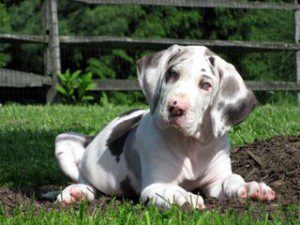Last week over on my Dog Food Dish blog, I wrote about the unique needs of large-breed puppies when it comes to feeding and puppy food formulas. The veterinary nutritionist I interviewed said that he considers any dog 55 pound or more (as an adult) a large-breed dog. That knocked my socks off.

I’d always figured that when people talked about large-breed puppies they meant REALLY large breeds … I guess, what many people call “giant breeds.”
For me, a 50-60-70 pound dog isn’t really that big. It’s all relative, I know.
In our valley, and even at our advanced pet dog training classes, most of the dogs are about that big. I’ve said before … Lilly, at around 35-38 pounds, is usually one of the smallest dogs at class.
The expert suggested that even dogs 55 pounds and up (when full grown) would benefit from a large-breed puppy food formula, which has fewer calories per cup than regular puppy food.
That means all our Labs and Goldens. Think about that.
Fewer calories help moderate a pup’s growth, which can help prevent a whole bunch of orthopedic problems.
This struck me hard since Ginko blew out both of his knees at age 3. We didn’t know exactly how big he would be since we really didn’t know what breed mix he was, but he ate regular puppy food.
I know that there were likely many reasons for his injury, but the idea made me rethink any future pup’s nutrition around here.
You’ll see in the comments from that blog post that one Twitter follower balked at the idea, but I’ll add here that her concerns were:
- That large-breed food doesn’t have enough protein for regular pups (The norm is 24-28% protein in puppy food.)
- That the cost was outrageous
I looked into both those things and found :
- At least for the brand for which my expert works (Wellness), the regular puppy food has 28% protein, and the large-breed formula has 26% protein.
- The cost for a 15-pound bag was just $2 more for the large-breed version.
My internal argument says it cannot hurt to be cautious with the calories for dogs that might get big-ish. What do you think?



I agree that 50lb is a large breed dog. However I think the most important thing for large breed puppy food is to get the correct ratio of calcium and phosphorus for the specific breed. Studies show this helps promote proper joint development. Calories can be controlled with portions. Protein levels vary widely across brands and formulations within brands. I think it is a mistake to be limited by the marketing segmentation done by labeling food “Large Breed”. Many times there is very little difference between puppy and large breed puppy formulations.
Hhhmmm…I’ve heard the “puppy food can make dog’s grow too fast/big” thing, but I’d love it if someone could explain the physiology, because it just doesn’t make sense to me.
Most mammals grow to the size, and at a rate specified by genes (talking height and length here, not weight). Nutrition can change this size over generations and generations of evolution (or sped up by breeding). I know of very few mammals that just keep growing if given time and food. Dogs aren’t one of them.
It seems to me like the real problem is overfeeding puppies and putting too much weight on them when they’re young. Being too roly poly as a pup puts too much strain on growing joints, causing problems down the road.
If we monitor our pups weight and growth, we should recognize when we need to add, cut back or experiment with ingredients to have a healthy dog. Does it mater if it’s done with puppy food?
If anyone knows of studies that show puppies speed up their rate of growth (not just weight) based on food type, I’d be interested in reading them.
Great point that not all puppy food is equal… The formula necessary varies between breeds.
I dogsit two Great Danes. I love them so much! That picture of the pup Dane was priceless! I’m glad that diet can help reduce orthopedic problems, as the breed certainly seems to be genetically prone to them.
Rod … I signed your petition and posted a link on FB. I hope it helps.
Been awhile since I posted, but I had to drop in here. I help with a golden retriever rescue and we do consider these dogs, large breed dogs. Especially when most of them top 70lbs (that we see go through the rescue). Since they are rescue pups I’ve seen them get fed a variety of food.
I remember watching one and he just FLEW. He’s a golden/lab mix, his siblings were adopted out early so I’m not sure what they were fed, but he was fed normal puppy food. He’s 90lbs and monstrous. I just remember thinking he was growing too fast.
Our boxer/lab mix, Toby, is 75lbs and he grew up on normal puppy food. He blew out his left knee at age 5, as well as his back. The food isn’t the only factor, but I wonder if it was a part.
We recently adopted a golden/border collie mix this winter… started on normal puppy food (her paws were insanely tiny, to the point we weren’t sure if she really was mixed with golden). She… I have no words. Just jumped in size every day. It was outrageous. By three months she was over 30lbs (I think closer to 40) and extremely lean. To the point the vet was on us about putting weight on her. She was eating 4 cups a day. I switched her to a large breed food, I’m not sure WHY it’s worked… it’s beyond me, but I hoped the Wellness formula LB puppy would help slow her growth down a little, and let her get some weight. It worked.
It is a lot more expensive than what she was being fed, but she looks healthier. I’m not sure this is a fix, I’m not sure if it was just an outrageous growth spurt and she’s just going slow for this past month… I don’t know. But she’s got muscle weight on her now, and she’s still trim. So I’m gonna stick with and see how she goes.
I was most attracted/sensitive to the beginning of your post – that many people consider a large breed dog to start at about 50 lbs. And to think that many hotels have a weight restriction that starts much lower than that. That means the America’s most common breeds like Labs and Retrievers cannot travel with their humans. I know you know about this – and hope you don’t mind me posting this in a comment – but there is a petition circulating on the internet that will be taken to hotel chains to support the lifting of weight restrictions. We’re a little more than 25% towards reaching our goal of 1,000 signatures. Hope your readers will hope over to http://www.petitionspot.com/petitions/givebigdogsabreak/ and sign.
It makes sense to me that fewer calories would not only be beneficial for slowing growth but also for keeping dogs trimmer — and therefore healthier.
My dog weighs 9 pounds. 55 seems pretty darn big to me.
Around here almost all the breeders I’ve talked to reccommend feeding any large breed puppy (50+lbs) adult food. Puppy food can cause them to grow too fast which is bad for their bones. Almost all adult food (that says “For all life stages”) is formulated for puppies needs but won’t cause them to grow faster then their potential.
I fed my toller who isn’t even that big of a breed (supposed to be 45lbs) Canidae since day 1. Canidae doesn’t even make a specific puppy formula because they agree that puppies don’t need that extra protein. Their all life stages formula is 24% protein.
We feed large breed food to one of our goldens. The other one is getting a mix of two organic foods (something new for us – until now we always did large breed conventional food).
I thought the way you did – but I guess the fact that the smallest dog I’ve ever had weighs in at 42 lbs colors my perception.
But then again, “village” and feral dogs tend to top out at under 40lbs.
Talos is adorable.
Poor Ginko.
Me Me Me Im a lage no giant breed. And a fussy eater too!
xx Major